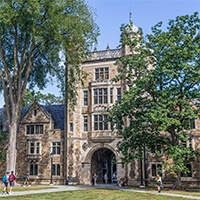By the time she turned 18, Paula Bennett had suffered abuse by her boyfriend, Kyron Benson, for more than a year. The list of beatings and verbal abuse Bennett endured provides context for a decision she made on an autumn night in 2007 to accompany Benson on a visit to a friend who, Bennett said, had stolen some of Benson’s belongings.
She sat in the car while Benson went inside and, assuming he was simply going to retrieve his things, was shocked when she heard gunfire as he shot and killed her friend. The couple returned to their home a few miles away in Belleville, Michigan, but were eventually arrested.
Benson was tried and convicted of first-degree murder. Bennett (who had refused a plea deal on the advice of her trial counsel) also was convicted of first-degree murder under the theory that she aided and abetted Benson in the commission of the crime. Both received mandatory sentences of life without parole.
While the facts are clear, the jury did not learn what lay behind Bennett’s decision to go with Benson to her friend’s home. In short, the physical and emotional abuse she had suffered pervaded every aspect of her life so that she conceded to his demand that she go with him that night—behavior that is not unusual for domestic abuse victims who are forced to commit crimes under duress or defend themselves against their abusers.
Bennett’s case eventually made its way to the Law School’s Federal Appellate Litigation Clinic, where 3L students work with Melissa Salinas, the clinic’s director and an adjunct clinical assistant professor of law, on cases that will go before the US Court of Appeals for the Sixth Circuit in Cincinnati.
The students filed an appeal before the Sixth Circuit on the grounds that Bennett received ineffective assistance of trial counsel. The appeal argued that Bennett’s counsel was constitutionally ineffective because his defense strategy was deficient and illogical, he failed to impeach a key state witness, and he failed to investigate and present evidence of the abuse Bennett suffered.
When the Sixth Circuit denied the appeal, the case provided an opportunity for the clinic to try a new approach for representing clients: a clemency petition to Michigan Gov. Gretchen Whitmer and the Michigan Parole Board.
The opportunity paid off when Bennett, along with two other women on whose behalf the clinic filed petitions, were granted public commutation hearings in October 2022. While not a guarantee of clemency, a public hearing is the last required step and a rare opportunity for a woman serving a sentence of life without parole.
Taking a different approach
The clinic initially represented Bennett, now 33, in her appeal to the Sixth Circuit and argued before the court in 2018. While waiting for the court’s decision, some of the students working on the case graduated and new students, including then-3L Alex Genord, ’20, joined the clinic in fall 2019. When Genord saw Bennett’s case on a list Salinas gave to students at the beginning of the term, she was compelled.
“The bulk of the traditional work that the clinic would do on the case had already been done,” said Genord. “So it was a unique case in the sense that we were not quite sure what it was going to look like for the students who ended up assigned to it.”
As it turned out, Genord and other students wrote a petition for writ of certiorari to the US Supreme Court in case the Sixth Circuit’s opinion was unfavorable. They also considered whether they should file a clemency petition on Bennett’s behalf to the Michigan Parole Board.
The Sixth Circuit denied Bennett’s appeal in late fall 2019, one day before she was scheduled to meet with Salinas, Genord, and another student. By coincidence of timing, it was Genord’s first meeting with Bennett.
“She was understandably upset but incredibly measured,” said Genord. “She was able to process the bad news and ask, ‘Okay, what are our next steps? Where do we go from here?’”
They told her that, while they were filing a cert petition to the US Supreme Court, the odds of the Court taking her case were slim. Once the Court denied certiorari in spring 2020, they turned their full attention to the clemency petition.
Genord read the trial transcripts, interviewed Bennett over the phone (in-person visits became restricted due to the pandemic), and helped write the clemency petition.
In the process, the team recruited Megan Richardson, then a clinical fellow with the Law School’s Innocence Clinic and currently a staff attorney at the Exoneration Project in Chicago.
They also approached Carol Jacobsen, U-M professor emerita of art and design, and of women’s and gender studies, who had been working with a lawyer on clemency petitions for 30 years as director of the nonprofit Michigan Women’s Justice and Clemency Project. During that time, the organization has helped free 13 women from life sentences.
Said Jacobsen: “Melissa [Salinas] contacted me, and I said, ‘Of course, I’ll be glad to work with you on that. And would you like some more cases?’”
In January 2021, the team filed petitions for clemency on behalf of seven women, including Bennett, who are serving life and/or excessive sentences at the Huron Valley Correctional Facility in Ypsilanti, Michigan. They all identify as trauma survivors and were convicted of crimes that were related to the domestic abuse or intimate partner violence that they had endured.
In August 2022, the team filed petitions for clemency for another three survivors who are all serving sentences at Huron Valley Correctional Facility. The student-attorneys carefully drafted the petitions in coordination with the women and requested commutation of their life and/or excessive sentences, stating that they did not receive a fair trial based on the facts of their cases.
Systemic problems
The team not only wanted to seek clemency for the women but also illustrate the systemic problems in Michigan law related to crimes committed by victims of abuse and how the justice system fails them.
“The state of Michigan is so severe in sentencing,” said Jacobsen. “It’s one of the top three in the number of women sentenced to life without parole in the nation.”
According to a letter the team penned to Whitmer, women are sentenced for first-degree murder for two common reasons: “When a woman fights back in self-defense, prosecutors generally stop seeing her as a victim herself; when a woman aids or abets violence by an abuser, our criminal justice system does not account for impact of past abuse on a woman’s intent and mental state.”
Michigan law strictly limits testimony by expert witnesses, allowing for only a general discussion of “battered spouse syndrome” while generally prohibiting expert testimony that is considered not of “probative value.” Additionally, most of the women in the clemency group were subject to Michigan’s mandatory sentencing statute for first-degree murder, which does not allow judges to consider domestic abuse the defendant suffered or attempts the defendant made to seek help from law enforcement before the crime.
“As long as you meet the minimum threshold for having been involved,” said Salinas, “they automatically get the same sentence. It’s mandatory, and a judge cannot give a lesser sentence. In Michigan, these rules all interact to create a really unfair system.”
Passion project
Once the clinic filed the petitions, they waited.
“You’re seeking a different type of relief—from a politician, not a court,” said Genord, adding that the case provided new challenges for the clinic, such as when most governors consider clemency petitions. “We asked, ‘Do we file it now, or do we wait until it’s clear whether Gov. Whitmer would be re-elected to a second term?’” The team basically tried to maximize the odds that the case would work out.
Salinas and Jacobsen spoke at each woman’s hearing, and Genord spoke at Bennett’s hearing along with Sinéad Redmond, ’21, who had argued Bennett’s case in the Sixth Circuit.
Now that the hearing is over, they will wait again. The timeframe for the governor’s office to make a decision is uncertain.
“The waiting is difficult for our clients and for us as advocates,” said Salinas. “But we are full of hope, and it is rewarding to know we are doing everything in our power to help our clients.”
Genord graduated before the petitions were filed and went on to work as a clerk with the US Court of Appeals for the Seventh Circuit in Chicago. But she was thrilled that Bennett and the other women were granted public hearings. And she was glad to be part of a new type of work in the clinic.
“It was very cool as a student to see Professor Salinas join forces with Carol and Megan to take on this additional project—which is not at all within the traditional definition of what the clinic does—just because they were passionate about it,” Genord said. “It wouldn’t have been possible for us to do all of this work without Professor Salinas being personally interested in and caring a lot about these women.”
Jacobsen, who has done this type of work for so long, valued the energy and enthusiasm of working with the clinic students.
“We need them,” she said. “We need change, and so we need these young attorneys.”







